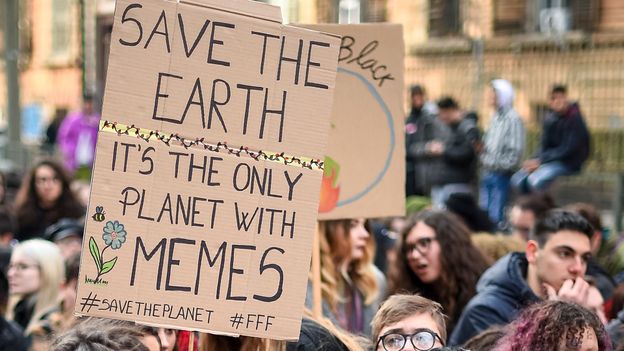The surprising power of internet memes

Shifman highlights that memes are used as political devices on all sides of a debate. “[Memes] unsettle power balances and allow normal people to express their voice, to express their anxieties,” she says. “On the other hand… memes could also be forces of governments, they’re now used by powerful corporations, they’re also used by extremists of all kinds.”
But memes can have an even darker side – helping to spread misinformation and conspiracy theories that can have impacts in the real world, as became apparent during the Covid-19 pandemic. Rather than being a way to present elaborate theories, memes have been described as offering “bite-sized” conspiracies that can be repeated, adapted and widely shared.
In the case of Covid-19, many of the conspiracy memes that surfaced were attempts to fill gaps in knowledge as the pandemic unfolded. “If you don’t know enough, you will fill the gaps, with whatever knowledge you can find,” says Alexander Jack, a forensic psychologist at Birmingham and Solihull Mental Health Foundation Trust who studied how Covid-19 conspiracy memes spread among mental health patients.
For those with mental health issues, conspiracy memes may be more problematic, warns co-researcher and forensic psychiatrist, Reena Panchal. “If you’re a vulnerable person, and you find someone or a group of people who share your views, you immediately feel a sense of belonging, and that kind of adds strength to your beliefs,” she says.
But while memes spread and shapeshift at a lightning rate, can we expect them to hang around as a form of expression in the future?
“This format of communication is here to stay because it’s a very stable way of expressing your individuality and your communality,” says Shifman. Gerbaudo notes that memes are already evolving – branching out more into video sharing. “TikTok videos are memetic in character,” he says. “They respond to challenges, which have a certain format, where people need to kind of play with a given, pre-established set of interactions.”
But whether memes are a force for “good” or “bad”, is largely down to how we choose to use them. “They’re neutral modes of communication,” says Galip. “You can make meaning out of memes depending on what you want to express.”
What’s clear is that the modest meme should not be underestimated. They conceal complexity and culture beneath their simple exterior. Online, memes are important facilitators of communication, belonging, and digital activism, that can both unite and divide us, depending on who we are and how we participate with them.
—
Join one million Future fans by liking us on Facebook, or follow us on Twitter or Instagram.
If you liked this story, sign up for the weekly bbc.com features newsletter, called “The Essential List” – a handpicked selection of stories from BBC Future, Culture, Worklife, Travel and Reel delivered to your inbox every Friday.


